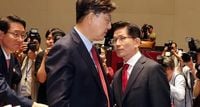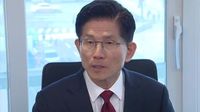On May 9, 2025, tensions escalated within South Korea's People Power Party (PPP) as Kim Moon-soo, a presidential candidate, faced legal setbacks that could reshape the party's upcoming election strategies. During a general meeting of lawmakers at the National Assembly in Yeouido, Seoul, Kim's bid to secure his position as the party's presidential candidate was thwarted by a ruling from the Seoul Southern District Court.
The court dismissed Kim's application for an injunction that sought to confirm his status as the party's candidate, as well as a separate request from seven heads of party support committees to prevent the opening of the National Convention scheduled for May 11. The court's decision allows the PPP to proceed with its plans to revise party regulations and potentially replace Kim with a non-affiliated preliminary candidate, Han Duck-soo.
According to the court's ruling, it was noted that Kim's claims of having preferential rights to be the party's nominee were not sufficiently substantiated. "It is difficult to see that the party priority right claimed by Kim has such a strong effect as to exclude the candidate unification procedure," the court stated. This ruling indicates that while Kim expressed intentions to unify with other candidates during the primary process, his claims to a guaranteed nomination were not upheld.
As a result of the court's decision, the PPP is set to hold a two-day opinion poll from May 8-9, which will include both party members and the public. This poll is crucial as it will help determine the final candidate at the National Committee meeting on May 11, 2025. The party leadership had confirmed these plans earlier, indicating a clear path forward despite the ongoing internal conflicts.
Lee Yang-soo, the party's Secretary-General, addressed the media following the court's ruling, emphasizing that the party would move forward with the candidate replacement process if consensus was reached during the general meeting. "If opinions converge at the general meeting or the emergency response committee, there is a possibility of candidate replacement," he stated.
The urgency of the situation was underscored by the fact that many members of the party reportedly support the idea of unification between Kim and Han Duck-soo, which could lead to a significant shift in the PPP's electoral strategy. Kwon Seong-dong, the party's floor leader, acknowledged the potential for consolidation to gain momentum following the court's decision, stating, "There is a possibility of that happening."
However, the internal dynamics remain complex. Park Hyung-soo, another floor leader, highlighted that Kim's clear refusal to agree to unification earlier in the day could lead to unexpected decisions emerging from the general meeting. He noted that the situation is fluid, and any developments could alter the trajectory of the party's nomination process.
Kim's side has indicated that they may file an additional injunction, which could further complicate the situation. While the court's ruling allows the PPP to proceed with its plans, any new legal challenges could lead to delays and continued uncertainty in the lead-up to the election.
In the context of this legal battle, the court emphasized the importance of allowing political parties to govern their internal processes without excessive judicial interference. The ruling stated that excessive intervention in internal party disputes could infringe on the freedom of party activities and should be limited to the minimum necessary.
This perspective aligns with the court's previous rulings, where it has consistently upheld the autonomy of political parties in managing their nomination processes. The court noted that while there may be internal conflicts, such matters should be resolved within the party rather than through judicial intervention.
The upcoming days will be critical for the PPP as they navigate these internal disputes and prepare for the National Committee meeting. The party's ability to unify behind a single candidate could significantly impact their chances in the upcoming presidential election.
As the situation develops, all eyes will be on the PPP's general meeting and the decisions made by its leadership. The outcome could set the stage for a dramatic shift in South Korean politics, particularly if the party successfully consolidates its candidate strategy in the face of internal dissent.
In summary, the legal ruling on May 9 has opened the door for the People Power Party to proceed with its election plans, but the internal conflict regarding candidate unification remains unresolved. How the party navigates these challenges in the coming days will be crucial in determining its electoral success.





